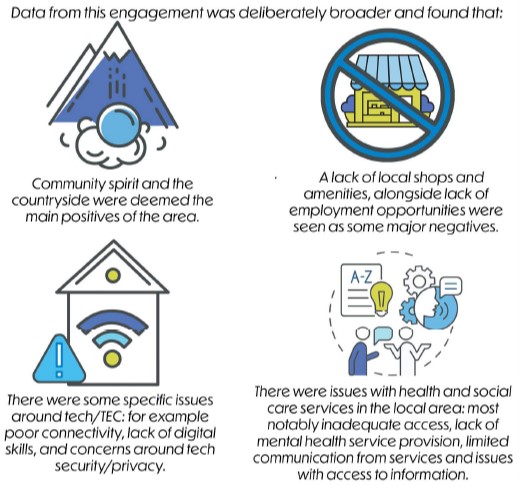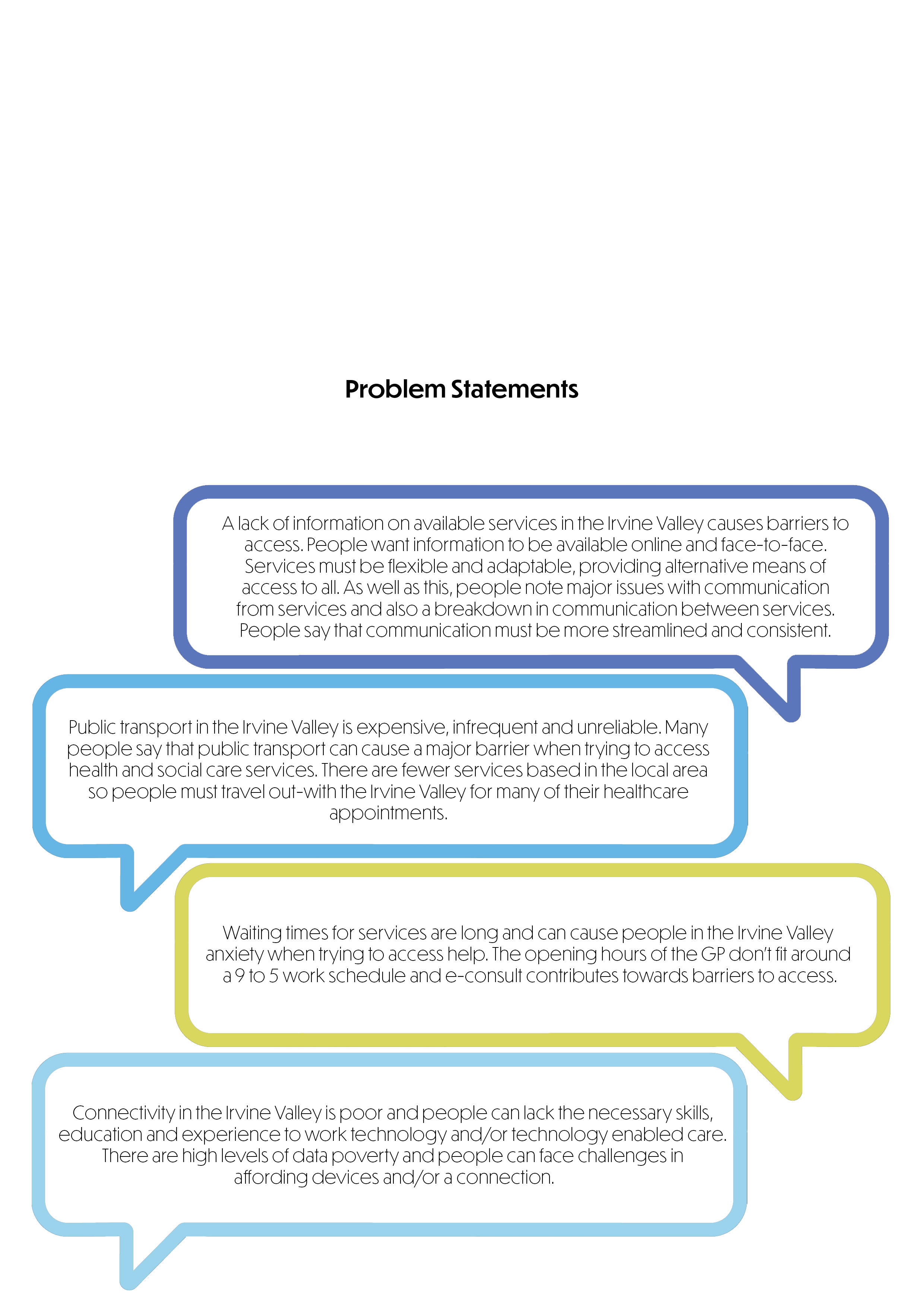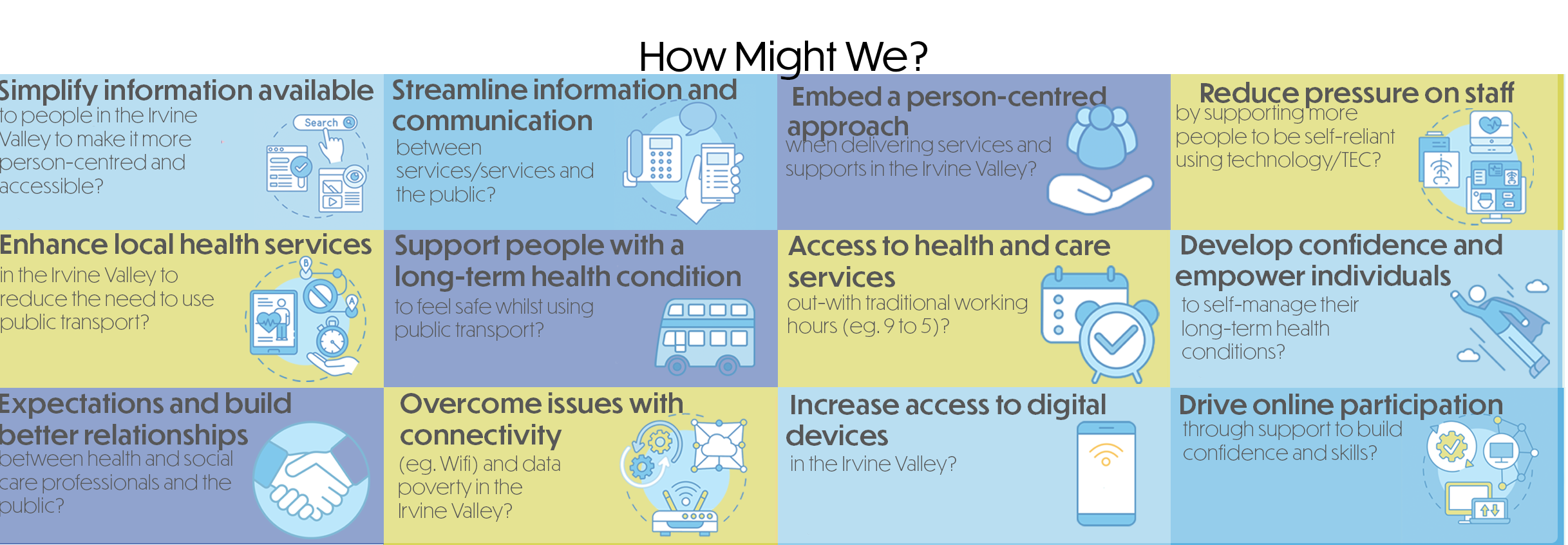Transforming health and social care provision for people with a long term condition living in the Irvine Valley, using the Scottish Approach to Service Design
Project Background
The East Ayrshire Health and Social Care Partnership (EAHSCP) Pathfinder project aim to use TEC as a key enabler to fully transform health and social care provision for people with long term health conditions living in the Irvine Valley.
The Pathfinder project aimed to build on the existing EAC peer mentor model to transform the health and social care workforce targeting those who work with residents from the Irvine Valley so that they are confident and supported to 'think TEC first'. The project hoped that any solution will support residents of the Irvine Valley to access relevant TEC Solutions* to support them to live at home, improve their capacity to self-manage and achieve their personal outcomes. (*All references to TEC relates to any technological or digital solution that can be used to improve health and social care delivery)
The programme adopted the Scottish Approach to Service Design (SAtSD) to ensure a consistent, common approach to designing services and supports across the public sector that makes it easier and more efficient to deliver transformation. A key focus of the Pathfinder is that the design approach and solutions are person-centred. Residents and stakeholders were involved in the Pathfinder project from the outset and continued to help shape the work through the various phases of our transformation.
Work within Discover and Define
In the Discover phase, the Pathfinder team designed and delivered a number of engagement activities (such as an online survey, paper questionnaire and phone interviews) to gather general opinions on the Irvine Valley. Data at this stage was deliberately broader and found that:

Having gathered Discover data, the Pathfinder team went through an extensive period of data analysis, synthesis and triangulation. All core insights and initial problem statements at this stage were gathered on the projects online Miro board. After this, the Pathfinder team carried out ten representative second-stage interviews with people in the Irvine Valley to sense-check this data from Discover and early stages of Define.
User Personas

Some examples of user personas are: a person with a long-term health condition; a person who is digitally excluded; a person over 65; a health and social care professional; a parent; and a public transport user. Personas were entirely anonymised (photos are not of people living in the Irvine Valley).
Problem Statements
From this point, using data from user personas and all other relevant data gathered throughout Discover and Define, the Pathfinder team revised their problem statements. These were finalised for the last stages of Define and are as follows:

How Might We? (HMW?) Statements
Using refined problem statements as a basis for workshops, the Pathfinder team held a total of five 'How Might We' (HMW) workshops to collect various HMW statements. At this point, the team worked with stakeholders and citizens to create these all-important statements which helped to reframe problem statements into opportunity areas. HMW statements look to inform the development of future ideas and potential solutions. For HMW statements workshops, 280 HMW statements were collected. The team worked to narrow these down to 12 key and final statements. These can be found below:

Our Next Steps
Between December 2021 and March 2022, the Pathfinder team ran a range of ideation workshops and prototyping activities again involving stakeholders, key partners and residents of the Irvine Valley. It is anticipated that any solutions found will have the ability to be replicated for use across other areas of the East Ayrshire and will ultimately lead to transformation of local systems.
Contacts – to find out more
Louise Lapsley - Louise.Lapsley@east-ayrshire.gov.uk
Alexia Pellowe - alexia.pellowe@aapct.scot.nhs.uk
